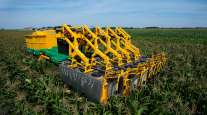Staff Reporter
AVs Could Alter Trucking Insurance Landscape

[Stay on top of transportation news: Get TTNews in your inbox.]
ORLANDO, Fla. — The emergence of autonomous vehicle technology could have profound repercussions for trucking insurance, according to a panel of experts Feb. 28 during the Technology & Maintenance Council Annual Meeting and Transportation Technology Exhibition.
“I think we’re all probably aware that emerging technologies start out in the large fleets, the national players with thousands of power units, and then trickles down over a decade or so into eventually the owner-operators,” said Mike Dorfman, chief operating officer at Koffie Financial.
“We see that with all kind of human-driven trucks today. I don’t suspect it’ll be much different with autonomous vehicles," he added. "I think the question is going to be are small- and middle-size carriers also going to bear the brunt of insurance rate increases.”
Dorfman noted that the adoption of autonomous trucks could result in rates rising industrywide even if it is primarily the larger fleets utilizing the technology. This would hit smaller carriers more negatively. He warned that insurance products need to be properly implemented for the entire industry.
“I think we’ve got to be really careful when we start building insurance products for AV trucks,” Dorfman said. “Because those fleets that may not have that technology out the gate are still going to bear some of the effects of that technology.”
Clayton Cavell, president at transportation insurance provider Paul Hanson Partners, echoed the concern while noting that there is a similar question regarding ownership structure in terms of whether the technology is going to have a disparate impact on smaller fleets. He indicated that a system in which truck manufacturers lease out vehicles instead of selling them could make matters easier for insurance providers from a products liability and negligence perspective.
Koffie's @Mikedorfman on the future of #trucking #insurance, but today!#insurtech https://t.co/2jTufi03ba — Koffie Financial (@KoffieLabs) December 13, 2022
“I think there would be a certain ease to that,” Cavell said. “But that’s not how autonomous vehicles are going to proliferate. We’re already seeing it. They’re bought by the large trucking companies or distribution companies, and they’re being put into use.
“Short of massive regulatory change or legislative change that drives the industry in a different direction, I don’t see there really being any difference in how that liability is transferred.”

Host Mike Freeze speaks with Online Transport's Randy Obermeyer about diagnostics. Hear the program above and at RoadSigns.TTNews.com.
Insurance companies have decades of real-world data to leverage when determining premiums. But that isn’t so much the case for autonomous trucks since the technology is new and evolving. Because of that, there are questions over how that should be determined.
“I think about the massive amounts of traffic data that’s available to insurance today,” said Andrew Roth, director of insurance at Koop Technologies. “With AVs, now you’re removing the driver, removing the operator, out of the vehicle. The expectation is that behavior is going to change and it’ll be a positive thing. But it’s an unknown thing. So, from an underwriting perspective, it’s intense.”
For underwriting, data is critical for understanding the risk. Our Singularity Platform takes data sharing to the next level by letting our customers easily share vehicle-specific data.
Learn more about the technology that goes into our underwriting https://t.co/zHjuJnjikv pic.twitter.com/urQt1oQ4Zb — Koop Insurance (@koop_ai) February 6, 2023
Roth is optimistic about the challenge because of its opportunities. He noted it requires a lot of communication with the manufacturers and starts with understanding the design domain of the vehicle as well as other specifics regarding real-world testing.
“There’s a huge opportunity to underwrite AVs, and that lies in the data that they’re collecting,” Roth said. “Ever since I have focused on the AV segment, I hear about collecting data all the time, both from within the insurance industry and outside.”
He added there was uncertainty around data collection at the beginning of autonomous trucks. It wasn’t even clear what data they should focus on. But Roth noted that progress has been made and insurance companies have a much better idea what they want to know from a risk perspective.

Legler
“I think fleet maintenance can be much more involved in the underwriting process as well as in the relationships between auto liability, business interruption and products liability,” said TMC Technical Director Jack Legler.
“Now what we’re doing is we’re replacing the driver with AI. And the AI is something that we haven’t invented, we don’t control as a fleet," he added, "but we are going to be responsible for making sure that AI is up and running like we are the rest of the vehicle.”
Want more news? Listen to today's daily briefing below or go here for more info:


&uuid=(email))


